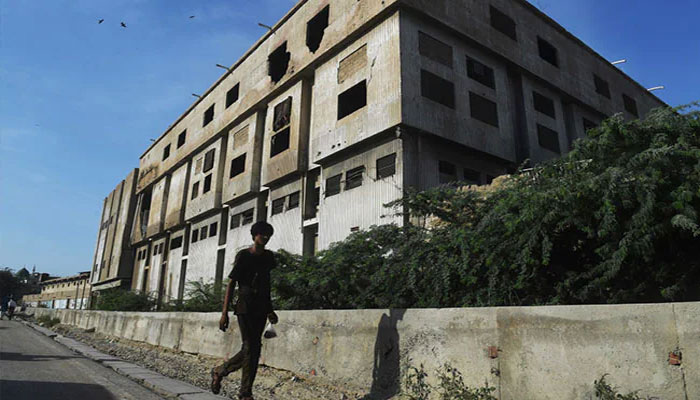Nine years on, justice still awaited for factory fire victims
Speakers at a meeting have stressed that a joint platform at national level is necessary to safeguard workers’ rights and movement because the health and safety conditions at factories are still at their worst even after the passage of nine years since the Baldia garment factory fire that killed 260 workers.
Addressing a two-day meeting titled ‘Recalling Baldia Factory Fire: Exploring Opportunities for Safe Workplaces in Pakistan’ held at the Piler Centre, trade unions leaders, experts and civil society activists said that the federal and Sindh governments have not demonstrated any seriousness in implementing the labour laws, and factories in the country still lack in their measures concerning health and safety issues.
“Pakistani factories have still not learnt from the incident of the Ali Enterprises. These factories don’t have a proper emergency alarm system. Workers are also not educated to use the fire extinguisher. And they don’t seem to have any plan to ensure emergency exits,” said Karamat Ali, executive director of the Pakistan Institute of Labour Research & Education (Piler).
“In this power imbalanced society, where workers are exploited and labour laws aren’t implemented, the trade union movement has systematically been reduced from time to time since Pakistan’s independence, and now only one per cent of the workers are unionised in the country.”
He said that the Ali Enterprises factory incident united workers on a global platform through the Clean Clothes Campaign (CCC), resulting in the distribution of short- and long-term compensation among workers by the Sindh High Court. “So, we need a similar united platform at regional and national levels to strengthen our movement and to improve workers’ health and safety.”
Nasir Mansoor of the National Trade Union Federation said that the recent factory fire in Korangi’s Mehran Town harked back to the Ali Enterprises incident in which fire engines could not enter the factory, and the space was so confined that the workers could not escape from the factory.
He lamented that no health and safety inspection is conducted at factories. “The CCC and the ECCHR guided us and supported us internationally for the cause of the Ali Enterprises, and because of their efforts, European brands have come under European law for workers’ compensation, especially the Ali Enterprises factory’s German brand KiK Textilien.”
Ineke-Zeldenrust, international coordinator for the CCC, shared with the participants the international accord to improve health and safety conditions in the Bangladeshi textile and garment industry, and this agreement will be expanded to Pakistan.
The agreement is between international brands and international trade unions and the Bangladeshi trade unions to pressurise these brands’ sellers to improve health and safety conditions in Bangladesh.
The accord is going to be implemented in Pakistan, as the evidence suggests that when Bangladeshi factories improved their health and safety conditions, it helped increase investment and exports of Bangladesh.
The meeting decided to hold a National Convention for Workers Confederation in Islamabad next month to organise workers and ensure labour rights all over Pakistan. Before the convention, labour groups will organise meetings in each province to prepare for the convention and to draw amendments to the country’s constitution.
The meeting also expressed willingness to organise workers of farms and factories at provincial and national levels. They stressed that the government must restore factory inspections and effectively implement health and safety laws at factories across Pakistan.
-
 Breaking: 2 Dead Several Injured In South Carolina State University Shooting
Breaking: 2 Dead Several Injured In South Carolina State University Shooting -
 China Debuts World’s First AI-powered Earth Observation Satellite For Smart Cities
China Debuts World’s First AI-powered Earth Observation Satellite For Smart Cities -
 Royal Family Desperate To Push Andrew As Far Away As Possible: Expert
Royal Family Desperate To Push Andrew As Far Away As Possible: Expert -
 Cruz Beckham Releases New Romantic Track 'For Your Love'
Cruz Beckham Releases New Romantic Track 'For Your Love' -
 5 Celebrities You Didn't Know Have Experienced Depression
5 Celebrities You Didn't Know Have Experienced Depression -
 Trump Considers Scaling Back Trade Levies On Steel, Aluminium In Response To Rising Costs
Trump Considers Scaling Back Trade Levies On Steel, Aluminium In Response To Rising Costs -
 Claude AI Shutdown Simulation Sparks Fresh AI Safety Concerns
Claude AI Shutdown Simulation Sparks Fresh AI Safety Concerns -
 King Charles Vows Not To Let Andrew Scandal Overshadow His Special Project
King Charles Vows Not To Let Andrew Scandal Overshadow His Special Project -
 Spotify Says Its Best Engineers No Longer Write Code As AI Takes Over
Spotify Says Its Best Engineers No Longer Write Code As AI Takes Over -
 Michelle Yeoh Addresses 'Wicked For Good' Snub At 2026 Oscars
Michelle Yeoh Addresses 'Wicked For Good' Snub At 2026 Oscars -
 Trump Revokes Legal Basis For US Climate Regulation, Curb Vehicle Emission Standards
Trump Revokes Legal Basis For US Climate Regulation, Curb Vehicle Emission Standards -
 DOJ Blocks Trump Administration From Cutting $600M In Public Health Funds
DOJ Blocks Trump Administration From Cutting $600M In Public Health Funds -
 2026 Winter Olympics Men Figure Skating: Malinin Eyes Quadruple Axel, After Banned Backflip
2026 Winter Olympics Men Figure Skating: Malinin Eyes Quadruple Axel, After Banned Backflip -
 Meghan Markle Rallies Behind Brooklyn Beckham Amid Explosive Family Drama
Meghan Markle Rallies Behind Brooklyn Beckham Amid Explosive Family Drama -
 Scientists Find Strange Solar System That Breaks Planet Formation Rules
Scientists Find Strange Solar System That Breaks Planet Formation Rules -
 Backstreet Boys Voice Desire To Headline 2027's Super Bowl Halftime Show
Backstreet Boys Voice Desire To Headline 2027's Super Bowl Halftime Show




